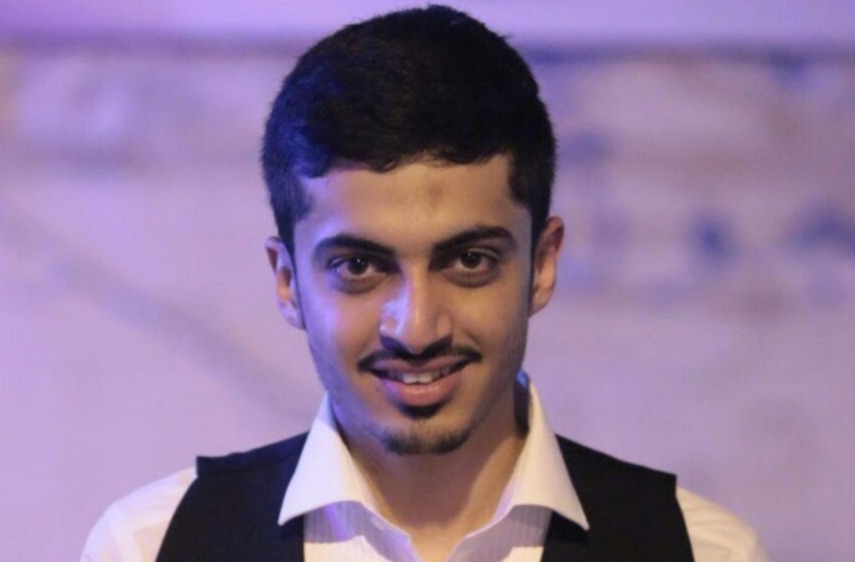Mohamed Yusuf AlAjmi is one of 17 Bahraini civilians tried before a military court in December 2017, in violation of internationally recognized fair trial rights. He is currently being held in Jau Prison after receiving sentences totaling 132 years in prison, in addition to a life sentence. Mohamed is one of the first political detainees imprisoned by a military court since the National Security Courts operated during a national state of emergency in 2011. Notably, the Bahrain Independent Commission of Inquiry found that the cases tried under these courts required civilian review because “fundamental principles of a fair trial, including prompt and full access to legal counsel and inadmissibility of coerced testimony, were not respected.”
Bahraini authorities actively pursued Mohamed for five years until his arrest in 2017. From September 2014 on, he was tried in absentia on multiple charges – including unlawful gathering, manufacturing explosives and Molotov cocktails, and attacking a public officer, among others – and sentenced to 127 years in prison, in addition to life imprisonment.
Ministry of Interior forces arrested Mohamed after they shot him in the neck during a raid on the peaceful demonstration in Duraz on 23 May 2017, which left five protesters dead. They held him in the Criminal Investigations Directorate (CID) for 42 days, during which time officers blindfolded and interrogated Mohamed. It is believed that he was also tortured during this time.
As a result of being blindfolded for extended interrogation periods during his detention, Mohamed developed an infection in his eyes. This was treated while he was in the CID, but after officers transferred him to Jau Prison on 4 July 2017, his eye infection returned and worsened. However, the prison authorities provided only painkillers and no other effective treatment. His family repeatedly complained to the Ministry of Interior Ombudsman, but Mohamed was not taken to a specialist for several months, by which time the infection had nearly run its course.
On 25 December 2017, the Bahraini Military High Court sentenced Mohamed in a collective judgment along with 17 other individuals after a trial that has been mired in allegations of torture and fair trial rights violations. He was sentenced to a further seven years in prison and stripped of his Bahraini nationality. On 21 February 2018 the Military High Court of Appeals reduced the sentence to five years, bringing his total prison term to 132 years, plus a life sentence.
The Government of Bahrain’s treatment of Mohamed contravenes a number of international laws and principles. Bahrain is in violation of its international obligations under the International Covenant on Civil and Political Rights (ICCPR) and the International Covenant on Economic, Social and Cultural Rights (ICESCR). Bahrain is a party to both of these treaties. Mohamed’s initial trials in absentia and the use of a military court to try civilians violate a number of fair trial rights in the ICCPR (Articles 9 and 14). Further, the prison authorities’ denial of adequate and effective healthcare for Mohamed is in violation of Article 12 of the ICESCR, which provides for the right to the highest possible standard of health.
Additionally, police conduct during the raid on the Duraz sit-in, in which Mohamed was violently arrested, also violates international standards. The use of lethal force against unarmed civilians taking part in a peaceful protest falls short of the standards set forth by the United Nations in the Basic Principles on the Use of Force and Firearms by Law Enforcement Officials of 1990, which provides for the use of lethal force by law enforcement in limited circumstances, such as defense of self or others against the threat of imminent death or serious injury, and states that “intentional lethal use of firearms may only be made when strictly unavoidable in order to protect life.”
ADHRB calls upon the Government of Bahrain to annul Mohamed Yusuf AlAjmi’s in absentia convictions, as well as the conviction before the military court, and to ensure that any future trial is in a civilian court that adheres to international standards for fair trials. We also call upon Bahrain to ensure that Mohamed and all other detainees receive necessary and adequate healthcare in a timely manner. Further, ADHRB urges the Government of Bahrain to reform the Ministry of Interior police forces, ensure that officers are trained in internationally recognized best practices, and hold all perpetrators of excessive force accountable.





